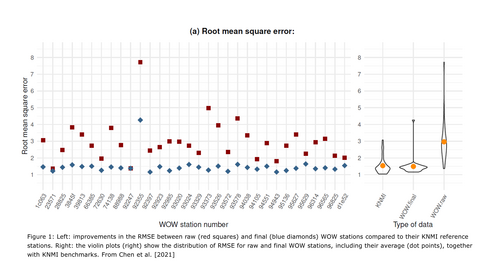Second Wind: Progress since September 2021
The 2021 Harry Otten Prize was awarded to Kate Saunders (Monash University, formerly Queensland University of Technology) and Kirien Whan (KNMI) to continue their research into crowd-sourced wind observations. Most weather warnings issued by KNMI are due to extreme wind gusts. Yet there are big observing gaps for wind gusts between official stations, as gusts are highly variable in space. The only feasible way to fill these gaps is with crowd-sourced observations. However, trust in crowd-sourced observation quality has been a barrier to date. The prize recipients intend to change this, and to help unlock the potential of these crowd-sourced gust observations for others. Their recent paper, led by master’s student Jieyu Chen, showed that high quality, crowd-sourced wind speed observations can be obtained after appropriate quality control and bias-adjustment procedures [Chen et al., 2021]. Figure 1 shows the improvement in data quality when comparing crowd-sourced WOW stations and official KNMI stations. This work shows the potential for crowdsourced wind speed observations and led to the development of the idea for the Harry Otten prize around wind gusts. Kate and Kiri are currently recruiting a PhD student to work on crowdsourced wind gusts. This project will be financially bolstered by the Harry Otten prize and will allow the PhD student to travel between Australia and the Netherlands. Contact Kate for more information.
Kate and Kiri have also collaborated with Gala Camacho Ferrari from DiagonalWorks to explore how Open Street Maps can be used to identify obstructions in the wind field based on the locations of buildings and other infrastructure. Gala created obstruction profiles for official KNMI and crowd-sourced stations in the Netherlands. These obstruction profiles show from which wind directions the stations have an unobstructed flow. The differences between official and crowd-sourced stations is stark. Following on from this work, Kate supervised a summer research student, Peter Tarbit, at QUT. Peter developed data-driven quality control methods to identify obstructions using the frequency of observed wind directions.
Research into the use of crowd-sourced observations also continues at KNMI. Kiri contributed to a discussion paper, led by collaborator Dr Irene Garcia-Marti, about the challenges a national meteorological service like KNMI faces in the use of third-party data, including crowd-sourced observations [Garcia-Marti et al., 2022]. Irene and Dr Jouke de Baar (KNMI) have supervised two masters students who explored multi-fidelity spatial interpolation approaches to combine high-quality KNMI data (‘first party data’) with lower quality data from trusted partners (e.g., Department of Waterways and Public Works, ‘second party data’) and crowd-sourced networks (‘third party data’) to a high-resolution grid. Danielle van Beekvelt (Utrecht University) developed Kriging methods so that they work well with noisy data and can differentiate between the systematic and random errors in first, second and third party data. She used a simulation study to show that for variables with high spatial variability, like wind gusts, the spatial interpolation is better when second and third party data are also included, compared to using only first party data. This also shows the potential added value for crowd-sourced data in operational applications. More recently, Kate has also secured funding from the QUT Centre for Data Science and Australian Centre of Excellence in Mathematical and Statistical Frontiers to install personal weather stations in schools. Students will start collecting the weather observations today that will be needed to understand the changing climate trends in their local community in the future. In particular, these personal weather stations will helping to fill observing gaps in more regional and remote areas in Australia. This work is ongoing and joint with researchers at QUT (Katie Buchhorn), at the Australian Bureau of Meteorology (Dr. Luke Cravigan) and at CSIRO (Dr. Carolyn Huston and Dr. Petra Kuhnert).
References
J. Chen, K. Saunders, and K. Whan. Quality control and bias adjustment of crowdsourced wind speed observations. Quarterly Journal of the Royal Meteorological Society, 147 (740):3647–3664, 2021.
I. Garcia-Marti, A. Overeem, J. W. Noteboom, L. de Vos, M. de Haij, and K. Whan. From proof-of-concept to proof-of-value: approaching third-party data to operational workflows of national meteorological services. International Journal of Climatology, 2022.
